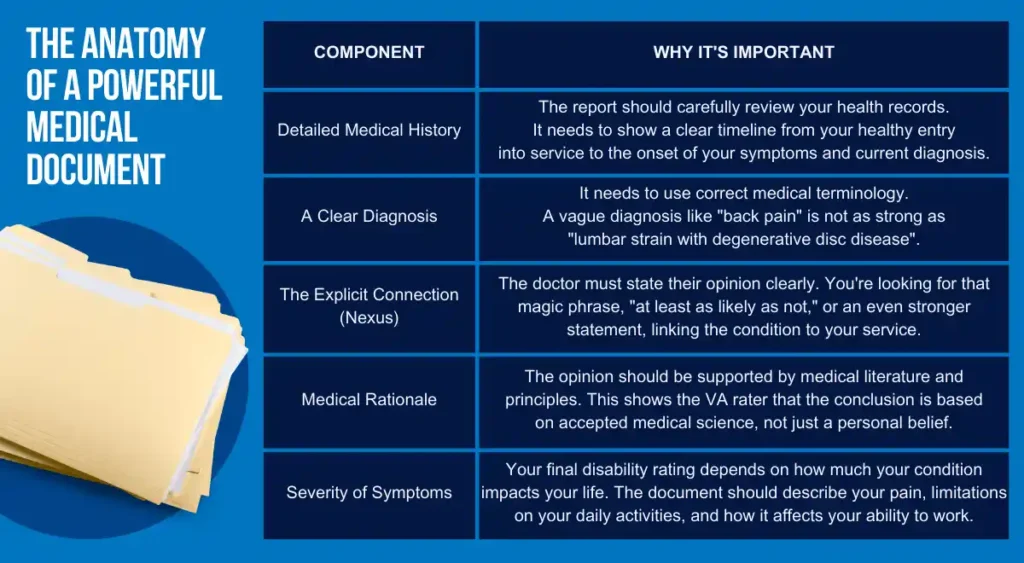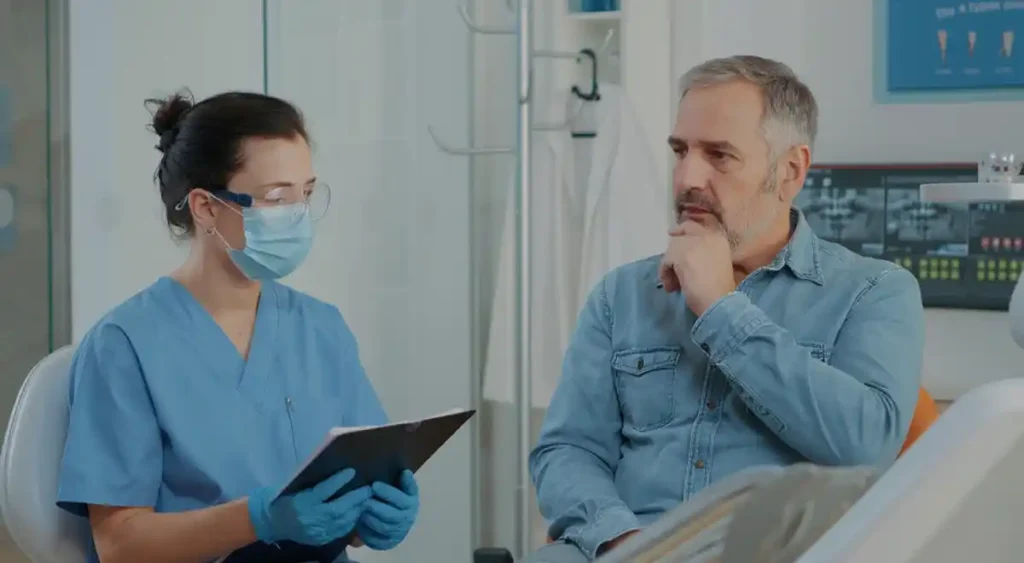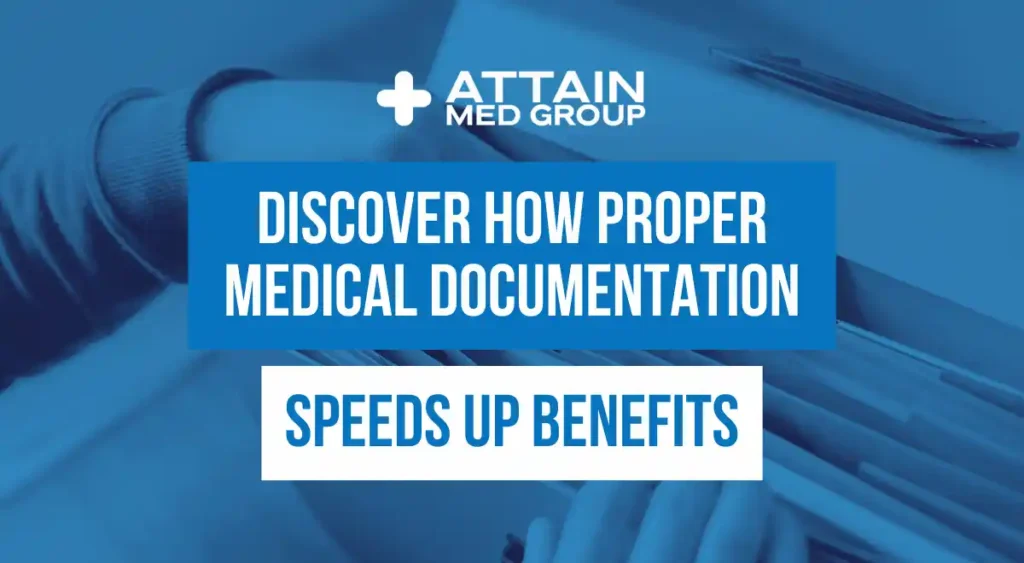Waiting for your VA benefits can feel like a marathon with no finish line in sight. You’ve served your country, you’re dealing with service-related medical conditions, and now you face a mountain of paperwork and long delays. You can, however, take control of the application process. It’s time to discover how professionally prepared medical documentation can cut down wait times and get your benefits faster.
This isn’t about finding a secret loophole. It is about giving the VA exactly what they need in the format they understand. You can dramatically shorten the processing time when you present a clear, well-supported claim from the start.

The Long Wait: Why Veteran Claims Take So Much Time
If you’re feeling frustrated with the average wait time, you are not alone. The Department of Veterans Affairs processes millions of disability benefit claims each year. This sheer volume is a big reason for the backlog that keeps you waiting for your disability benefits.
But the problem isn’t just the number of claims. Many get delayed or denied because of simple, fixable issues with the claimant’s medical evidence. The VA has to send them back for more information, which adds months, or even years, to your wait.
Common hold-ups include missing service records or incomplete patient records from health services. The biggest issue, though, is often the failure to clearly connect a current disability to your time in the military. This connection, or nexus, is crucial, and vague evidence from a treating doctor just won’t cut it during the evaluation process.
What Does ‘Professionally Prepared’ Even Mean?
So, what’s the difference between the medical records you have and professionally prepared ones? It is all about clarity, detail, and providing information that aligns with VA requirements. A simple note from your doctor saying you have a condition is rarely enough to secure your benefits people need.
Professional documentation is built specifically for the VA claims process and Social Security Disability. It anticipates the questions a VA rater at the DDS office will have and answers them directly. This preparation makes their job easier and your claim simpler to approve, leading to faster disability decisions.

The Nexus Letter: Your Claim’s Superpower
A Nexus Letter is a powerful tool for your disability benefit application. It is a detailed report written by a qualified medical professional. The letter gives a clear, evidence-based opinion connecting your current medical conditions to a specific event, injury, or illness during your military service.
This isn’t just a letter; it’s a medical argument. It cites medical research and reviews your service and post-service medical records, which may include electronic health records. Its goal is to show it is at least as likely as not that your service caused or aggravated your condition, which is the standard of proof the VA often uses for disability determinations.
Without a strong nexus, the VA rater is left to guess, and that often leads to delays or denials. A powerful Nexus Letter removes that guesswork completely, which is vital for both Social Security Disability Insurance and Supplemental Security Income claims. Your work history may also be a factor, and the letter can address how your condition impacts your ability to maintain employment.
DBQs and IMOs: Speaking the VA’s Language
Imagine trying to give someone directions in a language they don’t fully understand. That’s what a standard medical record can feel like to a VA rater. This is where Disability Benefit Questionnaires (DBQs) and Independent Medical Opinions (IMOs) come in.
DBQs are downloadable forms created by the VA, accessible through any official gov website. They are specific to certain conditions and ask the exact questions a rater needs answered for case processing. When your doctor fills out a DBQ, they provide information in the VA’s preferred format, which can speed up the processing of your initial disability claim.
An IMO is similar to a Nexus Letter but can cover a wider range of medical questions about your claim. It is a review of your file by an independent doctor who can provide a strong, objective opinion about your long term disability. It helps to clarify confusing parts of your medical history and strengthens your case for SSD benefits.
Discover How Professionally Prepared Medical Documentation Can Cut Down Wait Times and Get Your Benefits Faster
This is where everything comes together to reduce the average wait for a decision. Having the right paperwork isn’t just about getting a yes or no. It is about how quickly you get that answer and the correct disability rating for your disability insurance.

A Clear and Complete Picture
When a VA rater gets a messy, disorganized file, they have to work to piece the story together. They might need to send a request for more information from your health care providers. Each of those requests can add months to your wait.
A professionally prepared file is clean and organized. It presents your case logically, from your time in service to your current symptoms, using data from your electronic health record where possible. This means the rater can move through your file efficiently, making a decision much faster.
They have everything they need right at their fingertips in real time. This simple fact can be the difference between waiting months and waiting over a year for your Social Security Disability Insurance or other benefits.
Removing Doubt and Expedited Processing
The VA is required to help veterans develop their claims, sometimes by scheduling a Compensation and Pension (C&P) exam. While meant to help, these exams are a huge source of delays in processing times. It takes time to get one scheduled, and the results can sometimes be unfavorable.
For veterans with severe disabilities, strong evidence can be a path to expedited processing. Programs like Quick Disability Determinations (QDD) and Compassionate Allowances are designed to fast-track the most obvious cases. A thoroughly documented file with clear medical evidence is essential to qualify for these programs.
Strong, private medical evidence can sometimes reduce the need for a C&P exam. If your Nexus Letter and DBQ are so clear that there’s no question about your disability or its service connection, the VA may make a decision based on your file alone. By removing any doubt, you make the decision easier and potentially skip a major waiting period.
Getting It Right the First Time
A denial is one of the most heartbreaking things a veteran can face during a challenging time. It is discouraging and also throws you into the appeals process. The VA’s appeals system has its own massive backlog.
An appeal can sometimes take years to resolve. You can avoid that entire nightmare by submitting a strong, well-documented claim from the start. A fully developed claim is less likely to be denied outright for Social Security or VA disability benefits.
Think of it as an investment. Taking the time to get professional medical documentation now saves you from potentially years of waiting and fighting an appeal later. It’s the most effective strategy to shorten the overall timeline from application to receiving your first payment for Supplemental Security Income or security disability insurance.

The Anatomy of a Powerful Medical Document
What should you look for in these documents? A strong medical opinion that will support your VA or SSA disability claim should have a few key elements. They work together to build a strong case.
A powerful report should include a thorough review of all relevant medical evidence, including your complete patient records. It must be written by a qualified professional who understands the specific criteria used in disability decisions. Here is a breakdown of what makes medical documentation effective.

Without these components, the evidence is weak. With them, it becomes a powerful tool to support your claim for the security income you deserve.
Where to Find Help
So, where do you get this kind of specialized medical evidence? You have a few options. Not all doctors understand the specific needs of the VA or Social Security evaluation process, so you may need to look for specific help.
Many veterans choose to work with private physicians who have experience with these claims. These professionals know what raters look for and how to write effective Nexus Letters and IMOs. They can review your entire file and find the connections you might have missed.
When seeking help, be sure you understand the privacy policy of any organization you work with. Since you will need to share sensitive information, you want to be sure you are safely connected. Remember that a gov website belongs to an official government organization, so information there is reliable, but private services require more caution.
The important thing is to be proactive. Don’t just submit what you have and hope for the best. Take steps to build the strongest case possible from the very beginning.

Conclusion:
The path to getting your disability benefit can be long and full of frustrating delays. But you are not powerless in this process. By focusing on the quality of your medical evidence, you can take a huge step toward a faster and more successful outcome.
Professionally prepared Nexus Letters, IMOs, and DBQs can drastically reduce the average wait time by giving the VA a clear and complete picture. This helps avoid unnecessary C&P exams and reduces the risk of an initial denial that leads to a lengthy appeal. Investing the work upfront to build a solid claim is the best way to get through the system efficiently.
It’s your turn to take control of your claim. Now is the time to discover how professionally prepared medical documentation can cut down wait times and get your benefits faster. Your well-being and financial stability may depend on it.

